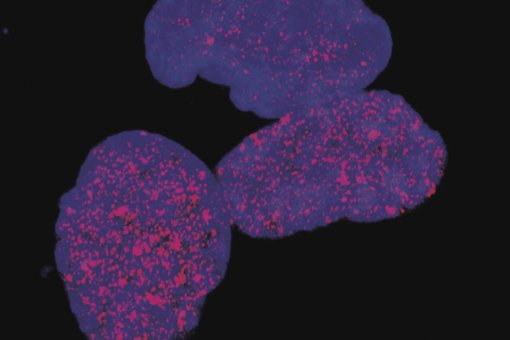Images
Participants











Contact

- Headed by Drs. Antonio Zorzano and Saska Ivanova, a study published in the journal Autophagy unravels the relationship between mitofusins (mitochondrial proteins) and autophagy.
- Using gene editing with CRISPR-Cas9, the team has been able to study these proteins without altering them or producing them in excess, thereby allowing observation of their true function.
- The research paves the way for the development of therapeutic strategies to regulate autophagy, address metabolic diseases, and promote healthy ageing.
Autophagy is the process by which cells digest and renew their internal structures, recycling damaged or malfunctioning proteins and organelles. By reusing these basic molecules, the cell gains the energy and resources needed to maintain balance. However, when autophagy is disrupted, it can lead to conditions associated with ageing, muscle loss (sarcopenia), and various metabolic diseases such as obesity and diabetes. In this context, the restoration of proper autophagy function could be a promising approach to improving health.
A team led by Drs. Antonio Zorzano and Saska Ivanova at IRB Barcelona has published a new study in the journal Autophagy that sheds light on the connections between the MFN1 and MFN2 proteins and autophagy. The study reveals details about how the cells recycle their components to maintain optimal metabolism and provides insights into potential strategies to tackle cell ageing and diseases related to metabolic disorders.
“The fact that these mitochondrial proteins regulate such crucial recycling processes helps us understand why their modification can lead to sarcopenia and other age-related issues,” explains Dr. Zorzano, who is also a Full Professor at the Faculty of Biology of the University of Barcelona and a member of CIBERDEM. “If we could design molecules that regulate these interactions, we would be able to prevent or reverse cell alterations related to the ageing process and metabolic disorders”.
CRISPR-Cas9 gene editing
One innovative aspect of this study is the methodology used: the team employed CRISPR-Cas9 gene editing to label the MFN1 and MFN2 proteins within the cell, without resorting to artificial overexpression. This approach allowed them to study mitofusins under conditions very similar to their natural state. “We labelled these proteins without altering them or overproducing them, which enabled us to better understand their true role in cellular recycling,” says Dr. Isabel Gordaliza-Alaguero, first author of the study.
This approach allowed the researchers to collect more precise data about how MFN1 and MFN2 interactions change in response to different nutritional conditions, including extreme nutrient deprivation. Their findings provide a better understanding of the mechanisms that regulate cellular energy balance—a key pillar of healthy metabolism.
Implications and future lines of research
In addition to deepening our understanding of cellular metabolism, these findings pave the way for potential therapeutic applications. Regulating autophagy through specific drugs or compounds could have implications for the treatment of metabolic diseases such as obesity and type 2 diabetes, which are linked to imbalances in lipid and protein production and degradation. Furthermore, improving autophagy function has the potential to slow cellular ageing by preserving organelle quality and preventing sarcopenia and other age-related conditions.
“The next step will be to determine the specific regions of the mitofusins that are essential for these new interactions, with the aim to design molecules that imitate or block them when necessary,” adds Dr. Ivanova. Using animal models, the team also plans to study how autophagy regulation influences long-term cellular energy balance.
This study was performed in collaboration with the labs headed by Dr. Maria Macias (IRB Barcelona and ICREA) and Dr. Manuel Palacín (IRB Barcelona, UB and CIBERER) and was supported by funding from the ERDF, the EU’s Horizon 2020 programme, the BBVA Foundation, the Fundación Marató de TV3 and ‘la Caixa’ Foundation.
Related article:
Endogenous interactomes of MFN1 and MFN2 provide novel insights into interorganelle communication and autophagy
Isabel Gordaliza-Alaguero, Paula Sànchez-Fernàndez-de-Landa, Dragana Radivojevikj, Laura Villarreal, Gianluca Arauz-Garofalo, Marina Gaya, Marta Martinez-Vicente, Jorge Seco, Pau Martín-Malpartida, Marta Vilaseca, María J. Macías, Manuel Palacin, Saška Ivanova & Antonio Zorzano
Autophagy (2024) DOI: 10.1080/15548627.2024.2440843
About IRB Barcelona
The Institute for Research in Biomedicine (IRB Barcelona) pursues a society free of disease. To this end, it conducts multidisciplinary research of excellence to cure cancer and other diseases linked to ageing. It establishes technology transfer agreements with the pharmaceutical industry and major hospitals to bring research results closer to society, and organises a range of science outreach activities to engage the public in an open dialogue. IRB Barcelona is an international centre that hosts 400 researchers and more than 30 nationalities. Recognised as a Severo Ochoa Centre of Excellence since 2011, IRB Barcelona is a CERCA centre and member of the Barcelona Institute of Science and Technology (BIST).




